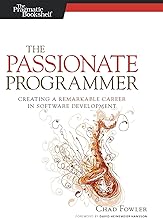The Passionate Programmer by Chad Fowler
Summary
The Passionate Programmer is a practical guide for developers who want to take charge of their careers in an increasingly competitive and globalised industry. Fowler’s advice is grounded in experience and delivered in short, punchy chapters covering everything from choosing the right projects to building daily habits of professional growth.
While the title celebrates “passion,” the book wisely goes beyond it. Passion may be helpful, but as Fowler’s examples suggest, it is neither necessary nor sufficient for success. Skill, intelligence, discipline, and technique matter far more. A cool-headed expert who consistently delivers is of greater value than a well-meaning enthusiast who flounders. Fowler encourages developers to treat themselves as investments, making deliberate choices and developing the ability to close projects and deliver value.
This book offers no magic formula. But it does provide an honest, experience-based framework for becoming a more valuable software professional.

Key Insights
The key insight of The Passionate Programmer is that your career is your responsibility. Don’t leave your professional development to chance—treat it as an ongoing project. Chad Fowler urges developers to think strategically: What business value do you offer? Where do you want to be in 90 days? What have you done today to improve your skills?
The book reads like a series of hard-won lessons. Whether it’s finding a mentor, planning your writing growth, or tracking your daily progress, the advice is grounded in experience. Fowler’s message is clear: if you want to thrive as a developer—especially in a high-cost country—you must bring something special to the table.
Strengths
The book’s greatest strength is its pragmatism. It doesn’t waste time on abstract theory, nor does it romanticise the tech world. Instead, Fowler offers practical steps to improve both your technical skills and your career direction. Advice like “practice daily,” “invest in yourself,” and “be a closer” is not only easy to understand, it’s immediately actionable.
Fowler also challenges assumptions: for example, that good developers can’t lead, or that hiring cheaper developers saves money. His arguments are backed by industry experience and carry a tone of credibility.
Weaknesses
The book offers a wide array of advice, but it occasionally feels more like a collection of blog posts than a tightly structured whole. There’s some repetition, and a few chapters feel less developed than others. Still, these are minor flaws in an otherwise compelling and valuable read.
Reflections
As someone who values personal improvement and structured planning, I found much to admire in Fowler’s approach. His emphasis on deliberate career planning, skill development, and daily logging aligns closely with my methods. But like all books of this kind, the challenge isn’t understanding the advice; it’s consistently applying it. A good tactic is to choose a handful of actions that resonate most, implement them, and revisit the book regularly to pick up more.
Conclusion
The Passionate Programmer isn’t a book of grand theories—it’s a practical guide to building a fulfilling and resilient software career. It reminds you that success doesn’t just happen. It’s engineered.
Book Details
Title: The Passionate Programmer
Author: Chad Fowler
Publication Year: 2009
Genre: Software engineering, Programming
🔗 Amazon
← Previous: In Sheep’s Clothing by George K. Simon